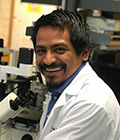
"Developing an FDA-compliant mRNA reprogramming strategy for treating Stress Urinary Incontinence"
Host Mentors: Vittorio Sebastiano, Ph.D. and Bertha Chen
Institute for Stem Cell Biology and Regenerative Medicine, Department of Obstetrics and Gynecology
Stanford University
Stress Urinary incontinence (SUI) is a urological condition in which urine uncontrollably leaks out in response to daily physical activities. SUI negatively impacts an estimated 15 million and costs over 12 billion healthcare dollars annually. Both women and men are affected however, women have additional factors; childbirth, menopause, previous surgeries, and age-related muscular atrophy that contribute to developing SUI.
Current therapies range from; surgery, physical therapy, electrical stimulation which offer marginal benefit to some patients, many of whom have tried everything else. Overall SUI poses financial, sociological psychosocial burdens and the need to develop a minimally invasive, safe, cost effective, long lasting and effective treatment exits.
As medicine adopts the clinical use of human induced pluripotent stem cells (hiPSCs), cell-based therapies are being investigated to treat numerous genetic diseases and a host of age-related various symptoms. Reprogramming a patient’s own human cells into (hiPSCs) offers a source of autologous and ethically friendly cell type.
The goal of the project is to develop a mRNA reprogramming strategy that is in compliance with the FDA’s guidelines including using reagents certified as current Good Manufacturing Practice (cGMP) for cell-based therapy. Good Manufacturing Practice (cGMP) ensures that the identity, strength, quality, purity is known and serves to minimize variability. In addition to the FDA’s requirements clinical practice demands that all reagents be animal-origin free, antibiotic-free, integration-free, and cell therapy drugs undergo minimal manipulation(s) before reintroduction back to the patient.
Overall the protocol begins with taking skin samples from patients and growing fibroblasts cells to be subsequently reprogrammed and expanded to 50 million hiPSC and differentiated to progenitor smooth muscle cells (pSMCs) for reinjection to the patient. In collaboration with Dr. Igor Kogut (University of Colorado) their mRNA/miRNA reprogramming protocol uses chemically defined reagents and offers a non-integrating, highly-scalable, feeder free and yields faster compared to current non-integration methods; AAVS1/6, episomal, protein, or Sendai Virus. The patient’s fibroblast cells are transfected every other day with a reprogramming mRNA/miRNA cocktail containing modified OCT4 (fused with a transactivating domain MyoD termed M3O) SOX2, KLF4, cMYC, LIN28A, NANOG combined with miRNA 367/302 mature mimics. Additionally, the media is supplemented with B18R protein which functions as a decoy receptor for type 1 interferons (IFN-1) mitigating a cell’s response to foreign RNA increasing the efficiency of mRNA reprogramming.
Following reprogramming individual colonies are selected for further expansion with chemically defined reagents to reach 50-60 million hiPSCs biobank stage. At this time, we have biobanked over 600 million hiPSC from four different patients. The biobanks are currently being validated by flow cytometry, rt-QPCR, mycoplasma detection, endotoxin detection, and karyotype analysis. In collaboration with Dr. Bertha Chen (Stanford) each mRNA/miRNA reprogrammed line will be differentiated into progenitor smooth muscle cells (pSMC).